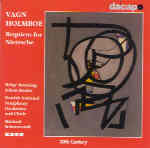If you don’t know the music of Vagn Holmboe, a Danish modern who is considered that country’s greatest composer behind Nielsen, you should. His 1963 Requiem for Nietzsche is a powerful work on many levels, a serious statement from a composer of genuine vision. Holmboe’s refusal to yield to the dogma of his time, to completely shift over to serial techniques or other such experimental ideology, works totally in his favor: this is timeless music, powerful on the strength of its musical statement rather than the politics of its aesthetic, much like Shostakovich. If in the course of this piece Holmboe does resort to some rather obvious devices (loud hammered chords on the words “hammer blows”, or the use of a Wagner quote on the word “Wagner”), it is always well done, at the service of the drama. In the hands of a composer of real merit, tricks such as these can work very well–and they certainly do here.
Requiem for Nietzsche is in no way a proper liturgical requiem. Based on texts by now-unknown (at least outside his native land) Danish poet Thorkild Bjørnvig, it does not so much tell the story of the life of the great philosopher but rather, according to the liner notes, “…integrates references of Nietzsche’s life into an imaginative recreation of his struggles.” Holmboe’s musical ideas are always clear and match the libretto, and his clever orchestrations sound; there is a natural flow to the work that is both dramatically and musically interesting. He can create all manner of moods, from the menace of the “Basel” movement and the quiet resignation of “The Moment”, to the incessant anger on the words “He would no longer Nietzsche be.” This requiem is like a baroque or classical oratorio heard through 20th century Stravinsky-loving ears, though not neo-classic–this composer never left this style, just finessed it. Under the baton of Michael Schønwandt, the Danish National Symphony and Choir sound startling, present, and on top of things, drawing all the necessary fire from the pooled resources. Baritone Johan Rueter is cunning in his many solo parts, mixing a forthright dark Wagnerian sound with the subtlety and capriciousness of lighter fare, and the sonics are splendid. A real find. [6/14/2002]
































